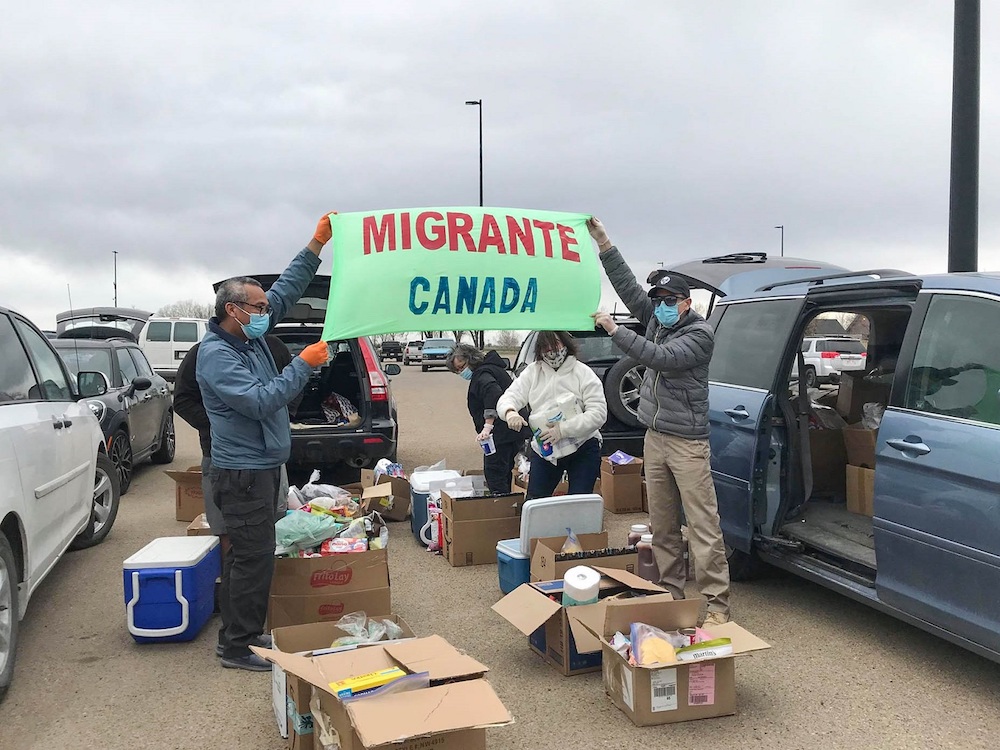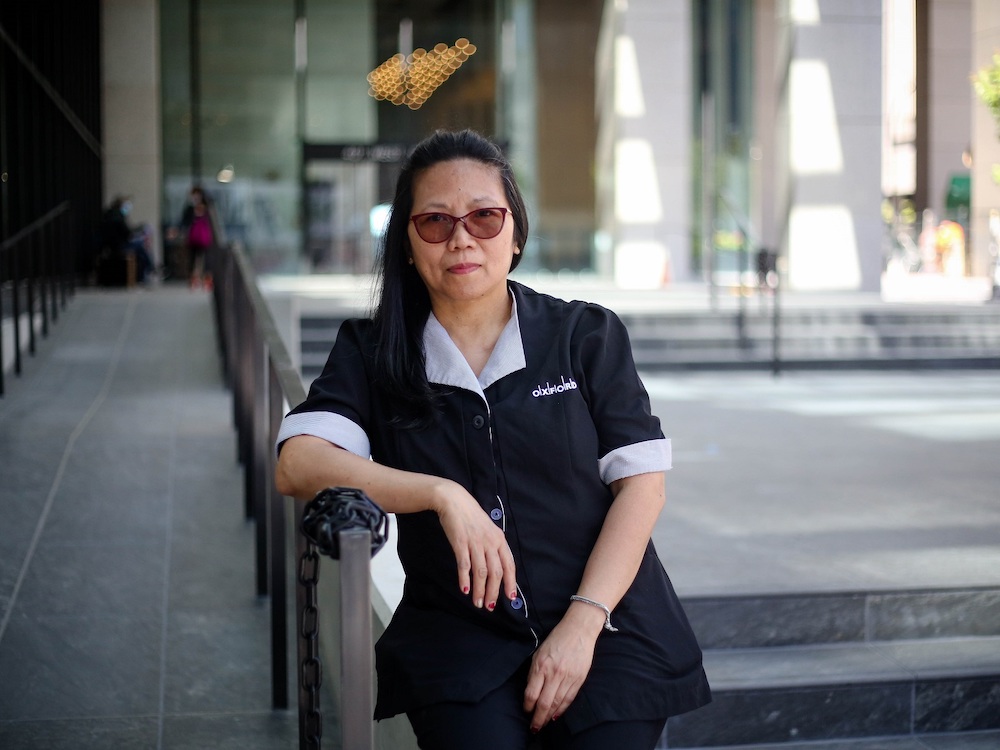Growing up, Loida Ubay and her siblings had an aunt in Hawaii who sent money to their family in the Philippines. The aunt worked many jobs while abroad, as a dressmaker, vegetable seller, nursery worker and housekeeper on a military base. The money helped support Ubay’s family, who were farmers producing crops like rice, beans and tomatoes.
When Ubay, the eldest of five children, turned 19, she left the Philippines to do the same.
“To leave home, I would say I was strong,” said Ubay looking back.
An agency helped her find domestic work with a Chinese family in Hong Kong, where she worked for eight years. Then she moved to Vancouver, where many of her friends had gone, to work as a live-in caregiver. It was physical distancing from her family far greater than two metres, and awaiting letters took weeks.
After moving to Vancouver, Ubay thought about attending school to become a sterile processing technician. It’s common for newcomers to land via the caregiver stream before seeking other opportunities.
“Of course, everybody has a dream to study for better wages,” she said. But ultimately, Ubay decided it would be too challenging to balance school with the responsibility of sending remittances to her family back home.
“So I work, work, work.”
Today, Ubay has three cleaning jobs. Even though COVID-19 has reduced her hours, she still works more than 60 hours a week, seven days a week. The bulk of her work is a job cleaning a downtown Vancouver office for minimum wage, though Ubay and her cleaner colleagues have recently unionized with SEIU, and she’s on the bargaining team asking for sick days and higher pay. Before the pandemic, even with a busy schedule, Ubay would make time for the occasional party with friends — “I still have to sometimes!” she said.
Ubay is 56, and in the 37 years she’s worked abroad she’s become like that aunt in Hawaii, sending money home. In addition to supporting her parents, Ubay supported eight nieces and nephews through higher education.
About half her income goes to family. Despite the reduced hours due to COVID-19, she still sends money twice a month to her parents and is still supporting the education of one niece and nephew.
“That’s why I have three jobs,” she said.
COVID-19 and the ‘empire of care’
The story of overseas Filipino workers like Ubay has gone on for decades, and it’s tied to Canada’s largest outbreaks of COVID-19.
On the sending side, the developing Philippines aggressively trains and encourages workers to go abroad and send money home. On the receiving side, countries like Canada craft policy to welcome workers to fill labour gaps.
As early as the 1950s, Filipino professionals like nurses, doctors and lab technicians immigrated to Canada to help fill labour shortages. But in the late 1970s, policies by both countries spurred the demographics to change from white collar to more working-class migrants; more clerical, manufacturing and service workers began to come to Canada.
Fast forward to today, and there are now more than 12 million overseas Filipinos in countries like Canada, the U.S. and Saudi Arabia. The Philippines is dependent on overseas workers to sustain the economy. Last year, remittances from the diaspora reached a record high of US$33.5 billion, about 9.3 per cent of the Philippines’ GDP.
“The Philippines has transitioned essentially into an agency to supply the world with workers,” said John Paul Catungal of the University of British Columbia’s Social Justice Institute.
The author and historian Catherine Ceniza Choy calls it an “empire of care,” and in her book of the same name she explores the irony of a developing country exporting skilled workers to wealthier countries.
Having to upgrade education can be another barrier for trained newcomers hoping to find jobs in the same professions they practised in the Philippines.
Agnes, a registered nurse from the Philippines who also worked in Libya, was unable to work in Vancouver right away when she immigrated in 2002 with her husband and young daughter. She needed a diploma to transition into B.C. health care, so she studied while working at a luggage store at Burnaby’s Metrotown.
“Good thing the owner was nice and let me bring my daughter to just sit,” said Agnes, which helped with childcare. Agnes, 50, now works in assisted living at a local care home.
With so many Filipinos filling essential jobs, they’re on the frontlines of the pandemic, and advocates say the diaspora is disproportionally affected by COVID-19. It takes a physical and also emotional toll, said Agnes.
Doctors and nurses are commonly viewed as the main frontliners — you only need look at signs in your neighbourhood of “thank you, health-care workers” to see that — but there are many others who do less visible work vital to keeping society going at this time.
“It’s the health-care workers, but also those who clean facilities, especially health facilities,” said Catungal. “It’s the folks who provide us food, prepare our food, cash us out at grocery stores. It happens that Filipinos are overrepresented in these lines of work, and it happens that these are historically undervalued and underpaid lines of work. And when we’ve had conversations about whether to raise minimum wage, there were people who discredit these workers, saying they don’t deserve it.”
Catungal, along with advocates like the Tulayan Filipino Diaspora Society, have called on the B.C. government to collect COVID-19 data on ethnicity to understand how certain groups like Filipinos might be harder hit. Manitoba is currently the only province to collect such data.
At the Lynn Valley Care Centre in North Vancouver, home to the worst seniors’ home outbreak in B.C. and Canada’s first recorded coronavirus death, most of the staff are Filipina Canadians, revealing a racial overrepresentation but also a gendered one. A count last month totaled 79 cases of COVID-19 among staff and residents, and the death of 20 residents.
Though B.C. does not have data on ethnicity and the coronavirus, provincial health officer Dr. Bonnie Henry acknowledged that the pandemic has caused people of colour to suffer disproportionately. The province does collect data on patients who self-identify as Indigenous as is federally mandated, though none of the data is made public.
Catungal has hypotheses why such data is lacking.
“Part of it is additional work,” he said. “But I think on a deeper level, we in Canada are quite resistant to talking about race and racism because of our self-congratulatory attachment to multiculturalism. The national narrative of ethno-racial harmony allows us to say things like, ‘We’re not in the U.S.’”
‘Sniffles’ and ‘sacrificial work’
Whether there’s data or not, Loida Ubay is feeling the weight of the pandemic firsthand. Aside from losing work hours and worrying about having less money to send home, there’s the people in her close circle.
Many of her family and friends aren’t able to follow instructions to stay home from officials like Henry because they are doing frontline work.
One of Ubay’s brothers, who works at a dog food manufacturing plant in Calgary, caught the virus. His wife, who works at a hospital, and his daughter, a Superstore cashier, did as well.
“It was so stressful,” said Ubay. “I called them two or three times a day. But they’re OK now.”
This highlights how essential work during the pandemic has become “sacrificial work,” said Ethel Tungohan of York University, the Canadian Research Chair in Canadian Migration Policy, Impacts and Activism.
“With the Filipino community stuck working in these essential industries, they’ve become the collateral damage of national economic growth policies,” Turbogan said.
And Filipino health-care workers have died of COVID-19. In Canada, there was Warlito Valdez of Richmond, B.C., who worked in a care home and was remembered as someone “you can talk to about anything.”
In the U.S., there was Araceli Buendia Ilagan of Miami, an associate supervisor in a cardiac surgical intensive care unit, remembered for being “in every single room helping every single nurse with every single patient.”
But despite the infrastructures and institutions in the Philippines that have matured to ensure that there is a constant export of workers to wealthier countries, this system is often reduced to harmful stereotypes.
In April, for example, Alberta’s chief medical officer Dr. Deena Henshaw said that there’s a “strong ethic in the Filipino community to not let the sniffles get in the way of a hard day’s work.” That same month, a New York Times report said that “migration is woven into the Philippines’ culture.”
Tungohan said that narratives like this ignore the fact that it’s not Filipino “culture” that makes them emigrate or hard working. It’s economic stagnation in the Philippines that leaves many families members with no other choice but to work overseas.
Meat plant prejudice
A COVID-19 outbreak at multinational Cargill’s meat-processing plant in High River, Alta. underscored the vulnerabilities of overseas Filipino workers.
The outbreak was Canada’s largest, with a count last month of more than 1,500 cases connected to the plant.
The vast majority of the 2,000 workers at the plant are people of colour, most of whom are immigrants, refugees or temporary foreign workers. About 70 per cent of workers are Filipinos. Three deaths connected to the plant were Hiep Bui, 67, a refugee from Vietnam; Benito Quesada, 51, a union shop steward originally a temporary foreign worker from Mexico; and Armando Sallegue from the Philippines, 71, who was visiting his son who works for Cargill and was diagnosed with COVID-19.
Aside from the threat of the virus itself, the outbreak at a majority non-white workplace resulted in discrimination in High River. Filipinos shopping at grocery stores have been asked whether they’re employees of Cargill, and were refused entry and the ability to purchase food. Some non-Filipino Albertans on social media blamed the Filipino community for spreading the virus.
Henshaw also said that carpooling and living in large households contributed to the spread of the virus, but UBC’s Catungal says this ignores how Filipinos workers can’t help but carpool to work if they don’t have a car or have a hard time finding housing due to discrimination.
As for Henshaw’s comments about not letting “sniffles” get in the way of a “hard day’s work,” Catungal says this paints Filipinos as prioritizing work over their own and other people’s health. “They became characterized as existential threats as themselves! And to others, because all they care about is work,” he said.
Aside from needing to provide for more than one household, Filipinos and other workers who are on temporary foreign worker permits are tied to serving their employer.
“One’s literal status in Canada is predicted on whether one is working,” said Catungal. “So it’s not about not letting ‘sniffles’ get in the way of work, but about staying in Canada, and the only possible way is to work.”
Migrant workers who complain could risk deportation, or become undocumented if their relationship with their employer — tied to their work permit — is severed. It’s also hard to speak up against a multinational employer in a small town of 13,600.
A Calgary Herald headline on the Cargill plant read “Meat plant disruptions cast long shadow as summer barbecue season heats up.” It’s since been changed to “Meat plant disruptions begin to impact supplies in stores,” but the first headline shows how the struggles of marginalized workers are often ignored, with worries instead over at-risk barbecue.
“It reminded me of a headline I read about Fukushima,” said Catungal of the Japanese nuclear power plant disaster in 2011, “about how it would affect people’s ability to eat sushi.”
A number of organizations have been speaking out about the impact of the pandemic on Filipinos in Canada, such as Migrante Alberta.
“Many of the people who called us were undocumented migrants when COVID happened,” said Marco Luciano, the non-profit’s director. “The fear stressing many of them out was the fact that they cannot access health care. If they get sick from COVID, what are they going to do?”

The non-profit has been campaigning for health care for them and has fundraised for basic care packages and grocery gift cards. They’ve also delivered homemade meals to Cargill’s workers.
“Most Albertans don’t know that undocumented migrants don’t jump borders,” said Luciano. “They had permits, and they lost their permits… and they decided to stay or apply through other pathways. But while they’re waiting, they don’t have status, and they continue to work in our communities. They continue to rent in Alberta, shop in Alberta, and spend their money in Alberta like everybody else. And so, they deserve basic services like health care.”
The precarity of these workers means that the people employing them for undocumented work, jobs like cleaning or dishwashing, can get away with paying them less than minimum wage.
“But they want to work, and this is the only way,” said Luciano.

Temporary fix for permanent jobs
These days Ubay sends remittances online to save her from more in-person contact. In addition to money, she also sent her family a balikbayan box — a package that overseas Filipinos fill and send home via cargo — with coffee and canned goods.
“I’m so generous to them!” said Ubay with a laugh on a recent Wednesday before starting her cleaning shift downtown.
“Some people say, why you give so much? But I want to give them even more.”
A Statistics Canada study on money transfers in 2017 found that the top country Canadians sent money to was the Philippines, totalling $1.2 billion.
That number has likely grown with the number of Filipino Canadians. The 2016 census counted 588,300 permanent residents and citizens, with one-third of them having arrived between 2011 and 2016. Temporary workers aren’t included in this count.
There is a phrase to describe overseas workers like Ubay that support their families back in the Philippines: “bagong bayani,” which means “new heroes.” It has been used by the Philippines government since 1984, giving out bagong bayani awards to the overseas workers it deems outstanding.
But the phrase, according to some academics and advocates, focuses on the noble sacrifice of workers — playing into the idea of a “model minority” — rather than their vulnerability abroad.
Catungal believes more research would help illuminate the long-term impacts of family separation, and the important role of support networks for the Filipino diaspora.
His colleague Tungohan adds that it’s crucial to examine the intersections: “It’s not just a matter of labour. It’s not just a matter of immigration. It’s not just a matter of health. It’s about all these intersections, and how all forms of oppression are intersecting.”
Ask Luciano of Migrante Alberta what he thinks of Canada’s foreign worker programs and he will say “flawed.”
“These are not temporary jobs. It’s important for us to tell our government that these are permanent jobs,” Luciano said. “But these are jobs Canadians don’t want to take…. It’s important for us Canadians to start treating migrants as people, not as a disposable workforce to recruit, use and dispose. It’s a vicious cycle of importing labour. That’s something people should know. Then next time they take a bite out of an apple, they’ll think twice.” ![]()
Read more: Coronavirus, Labour + Industry

















Tyee Commenting Guidelines
Comments that violate guidelines risk being deleted, and violations may result in a temporary or permanent user ban. Maintain the spirit of good conversation to stay in the discussion.
*Please note The Tyee is not a forum for spreading misinformation about COVID-19, denying its existence or minimizing its risk to public health.
Do:
Do not: